This post was originally published on this site
The Federal Reserve may be wrong, but at least officials there won’t be flying blind now that the government will stay open, keeping the nation’s flow of economic data still running. In the early going, there was something of a relief rally, though it quickly evaporated.
As the fourth quarter starts, a new note from Goldman Sachs strategy team, led by Cormac Conners, makes the case that the Magnificent Seven stocks are now looking … cheap.
The grouping — Apple
AAPL,
Microsoft
MSFT,
Amazon
AMZN,
Alphabet
GOOGL,
Nvidia
NVDA,
Tesla
TSLA,
and Meta Platforms
META,
— has seen their next 12 month price-to-earnings ratio fall to 27 from 34. The S&P 493, however, has seen their price-to-earnings ratio fall more narrowly, to 16 from 18.
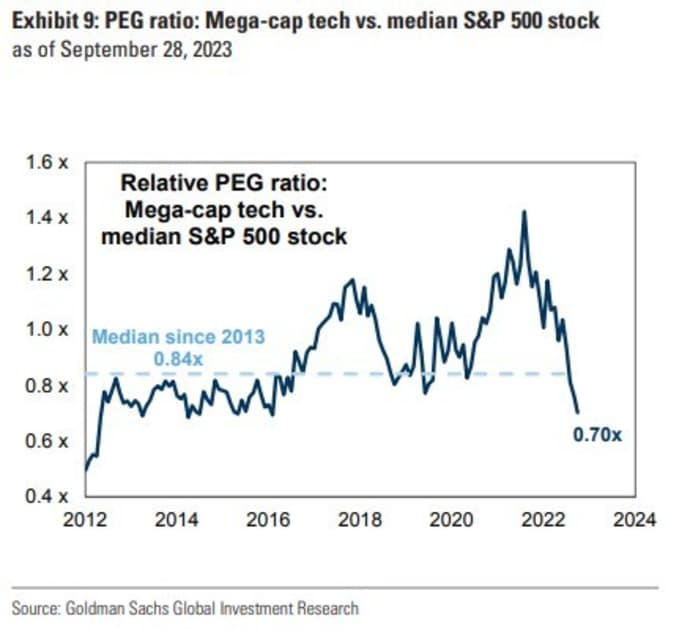
Put a different way, the largest tech stocks trade on the cheapest valuation relative to the median stock in over six years, the strategists say. The Magnificent Seven trade at 1.3 times their PEG ratio (price-to-EPS-to-long-term growth), versus 1.9 for the median S&P 500 stock. That discount, the strategists say, has been reached only five times in the last decade. As recently as January, they traded on an 18% premium in PEG terms.
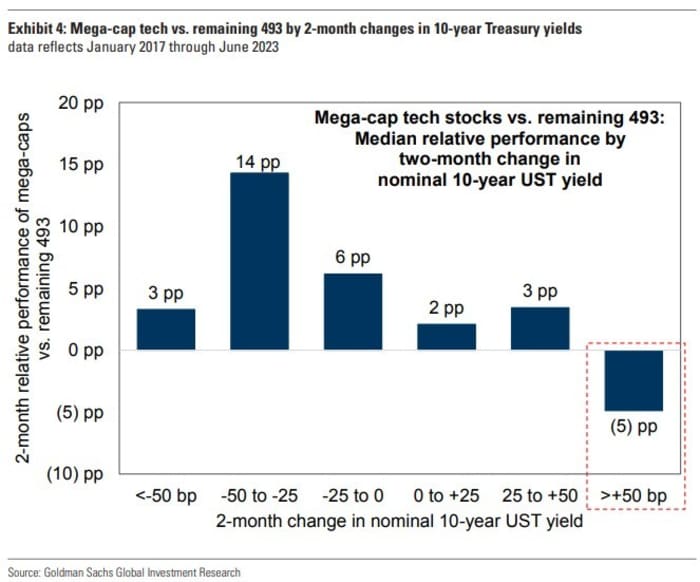
So why did the mega-cap techs fall in the first place? One key driver, the strategists say, was the rise in long-term yields. “The underperformance of the largest long duration tech stocks in the face of soaring Treasury yields is consistent with the trading pattern of the last five years: The largest stocks have tended to struggle in the face of greater than 50 bp increases in the nominal 10-year yield over two months,” they say. This time around the 10-year yield rose 62 basis points in two months. Goldman’s own forecast for the 10-year to dip marginally, to 4.3% by the end of the year, and then rise again to 4.6% in the first quarter.
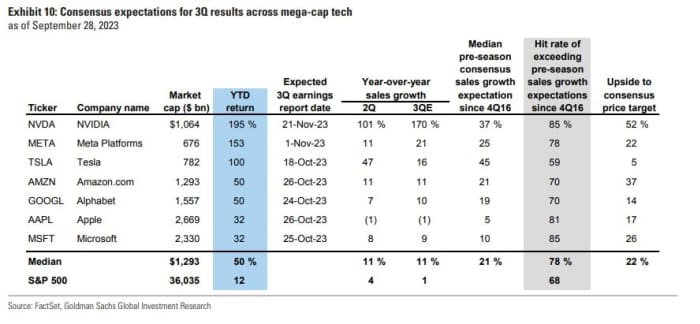
But that’s not the only positive driver for the Magnificent Seven. In the upcoming third-quarter earnings season, the largest tech companies are expected to register 11% sales growth, compared to just 1% for the S&P 500 as a whole. Historically, the megacap tech stocks have beaten so-called preseason sales expectations more than the broader market has, the strategists added.
The markets
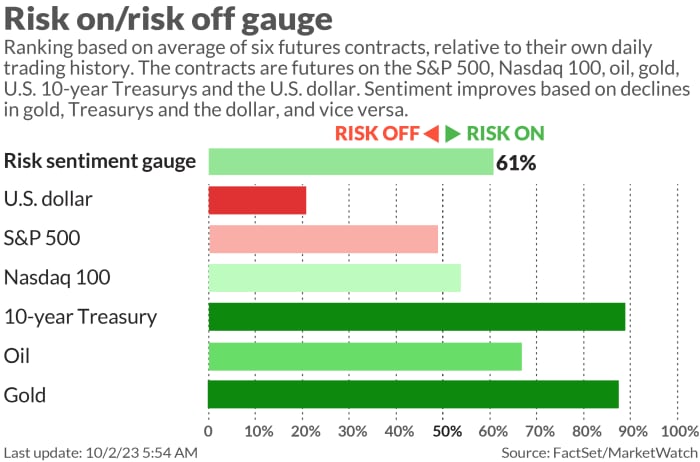
U.S. stock futures
ES00,
NQ00,
were flat, after the S&P 500
SPX
fell 3.7% last quarter. The yield on the 10-year Treasury
BX:TMUBMUSD10Y
reached 4.64%. Que sera, sera.
The buzz
The U.S. Congress surprisingly avoided a shutdown, with 45 days of funding at existing levels.
The ISM manufacturing report is due at 10 a.m. Eastern, with construction spending also set for release.
Fed Chair Jerome Powell is due to speak at a York, Pa. roundtable with Philadelphia Fed President Patrick Harker, according to reports. The Fed’s calendar has Vice Chair for Supervision Michael Barr speaking on monetary policy and financial stability.
Sphere Entertainment
SPHR,
shares rose 8% after the successful opening of the Las Vegas Sphere.
The 5 weirdest stories about Sam Bankman-Fried that Michael Lewis told “60 Minutes.”
Random reads
Does China’s property bust make a financial crisis inevitable?
Why central banks will soon lend to hedge funds.
Why frequent-flier miles are no longer worth bothering with.
Top tickers
Here were the top stock-market tickers as of 6 a.m. Eastern.
| Ticker | Security name |
|
TSLA, |
Tesla |
|
AMC, |
AMC Entertainment |
|
NIO, |
Nio |
|
NVDA, |
Nvidia |
|
GME, |
GameStop |
|
AAPL, |
Apple |
|
TTOO, |
T2 Biosystems |
|
PLTR, |
Palantir Technologies |
|
NKLA, |
Nikola |
|
AMZN, |
Amazon.com |
The chart
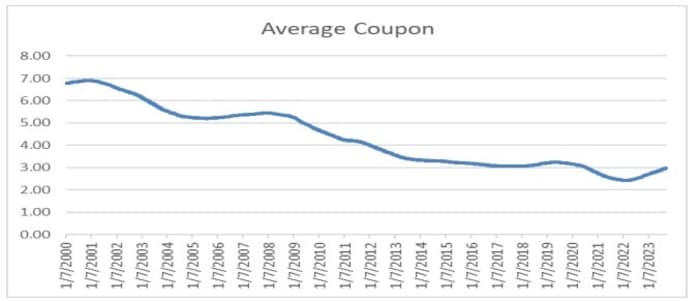
Peter Tchir of Academy Securities said smart borrowers have made Fed policy laggier. That is, companies and households who locked in low interest rates prior to the Fed rate hike cycle have diminished the impact of the Fed’s tightening campaign. Here he charts the average coupon in Bloomberg’s Corporation Bond index. He has also a different chart showing how investment-grade issuance peaked in 2020, and has dropped three straight years.
Random reads
Former President Jimmy Carter, who has defied experts with his continued longevity, is apparently enjoying “Law and Order” and Atlanta Braves baseball in addition to keeping with up the news.
These cost-conscious Australian retirees booked 51 consecutive cruises, because it’s cheaper than a retirement home.
Need to Know starts early and is updated until the opening bell, but sign up here to get it delivered once to your email box. The emailed version will be sent out at about 7:30 a.m. Eastern.
Listen to the Best New Ideas in Money podcast with MarketWatch financial columnist James Rogers and economist Stephanie Kelton.

